King of the Hill has had a cult following since it first aired in 1997, and now, thanks to Hulu, the entire series is available for fans to binge-watch. For 13 seasons, King of the Hill made America laugh with outlandish but down-to-earth perspectives on mundane life in Arlen, TX. The memorable characters have spawned numerous King of the Hill fan theories and a series of look-alike memes, and fans have analyzed every aspect of Mike Judge’s creation.
While The Simpsons thrived on chaos and subverting expectations, King of the Hill shined by hilariously reveling in the banality of its characters while also allowing them to evolve throughout the show. And just like The Simpsons, there’s a fascinating history behind King of the Hill and the people who brought the show to life.
1. ‘Lucky’s Wedding Suit’ Was Almost The Series Finale

King of the Hill ended its 13-season run with “To Sirloin With Love,” which aired on Fox on September 13, 2009. In another timeline, though, King of the Hill would have ended two years earlier. Before Fox ordered two more seasons at the last minute, Season 11 was supposed to be the last. This is why “Lucky’s Wedding Suit” feels more like a series finale than your run-of-the-mill season finale.
As Luanne walks down the aisle, a montage of minor and one-off characters – like the social worker from the first episode – plays out. The episode also features callbacks to Season 1 gags, like when Cotton demands a mai tai from Kahn, or when Chuck Mangione plays “Feels So Good” at the wedding.
2. Some Of The Most Memorable Episodes Were Nearly Retconned
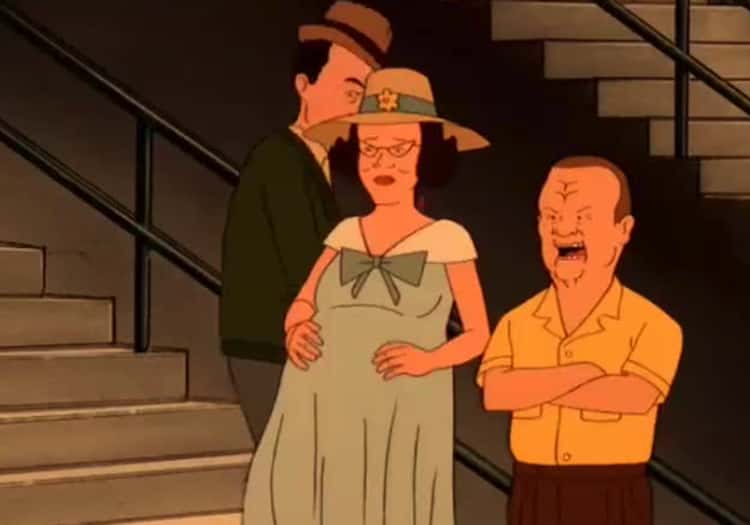
In the first draft of “Lucky’s Wedding Suit” – originally written as the series finale – Hank and the gang have a conversation that would have suggested some serious retcons. The script, shared via Twitter by King of the Hill writer and executive producer Jim Dauterive, sets the timeline for the series to just one year, beginning when Luanne moves in with the Hills. There is even a line poking fun at the absurd one-year timeline, as Hank says, “Boy, I can’t believe it was just a year ago that Luanne’s mama stabbed her daddy with a fork and she moved into our house. It feels like 10.”
The most interesting aspect of the original draft isn’t the timeline, though – it’s the fact that the retcon apparently would have painted some of the show’s craziest episodes as hallucinations. The events of episodes like “Yankee Hankee,” which revealed Hank was born in New York because his dad wanted to kill Fidel Castro at Yankee Stadium, and “Tankin’ It to the Streets,” the episode in which Bill steals a tank from an army base, would never have happened.
3. The Show Almost Became Too Crazy For Mike Judge
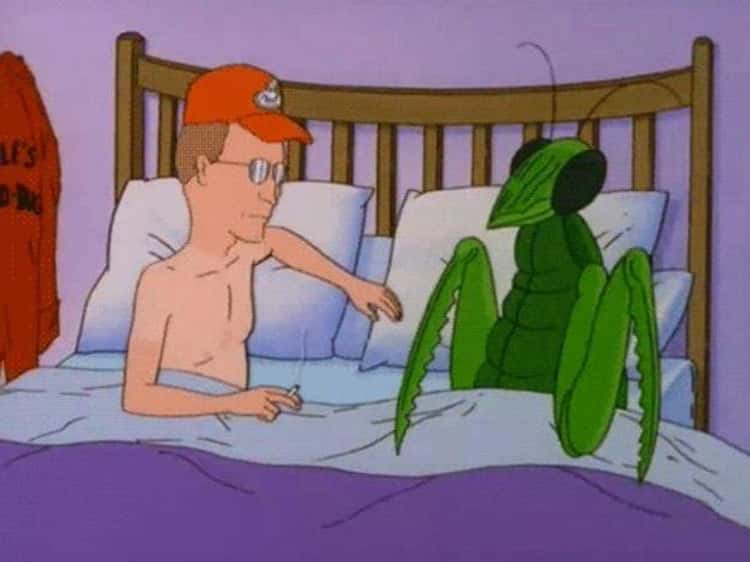
King of the Hill was sold to Fox as a down-to-earth satire about Middle Americans enjoying their somewhat ordinary lives. But around Season 5, some of the show’s storylines veered into surreal territory. Series co-creator Mike Judge wasn’t happy with some of the characters’ antics, like when Cotton tries to assassinate Fidel Castro, or when Hank becomes a pimp. Season 6 deviated even more from the show’s original slice-of-life format, featuring over-the-top plotlines and punch-down jokes that Judge did not agree with.
For Season 7, longtime writers John Altschuler and Dave Krinsky took over as showrunners. The duo brought King of the Hill back to small, personal stories about everyday people.
4. To Understand Hank Hill, The Writers Read ‘The Death Of Common Sense’
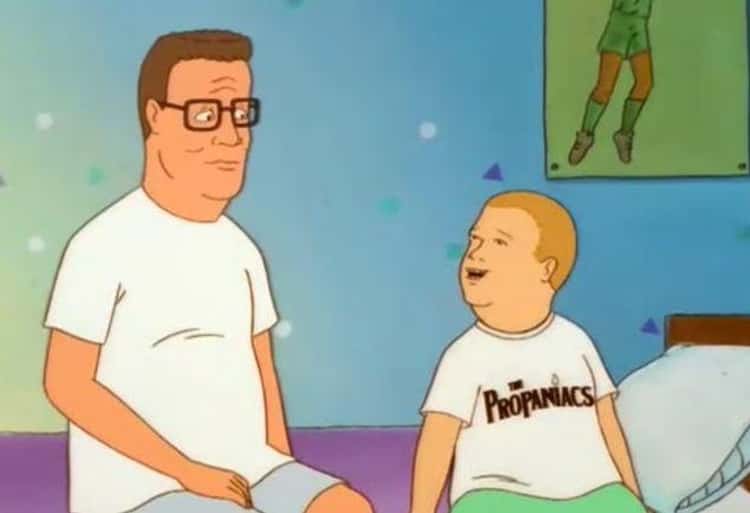
Even though King of the Hill often pokes fun at Hank’s naiveté, the show champions his simple, no-nonsense perspective on life. To get inside the head of Hank Hill, co-creator Greg Daniels had the writers read The Death of Common Sense.
Written by Georgetown law professor Philip K. Howard, The Death of Common Sense argues that excessive government regulations and the bureaucratic process encumber our ability to get things done. When you look back at classic episodes like the series opener, in which Hank is falsely accused of abusing his son, or “Junkie Business,” in which Hank is forbidden from firing a drug addict because his addiction is considered a disability, the influence becomes clear.
5. Monsignor Martinez Almost Had A Live-Action Spinoff
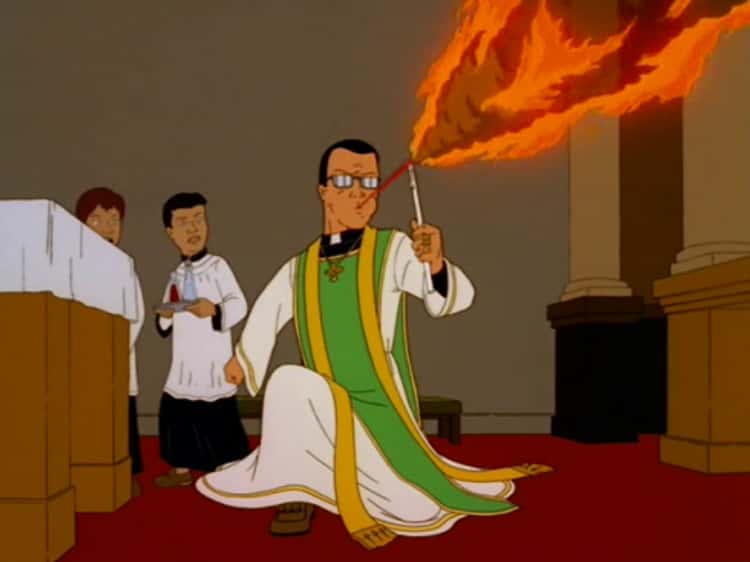
Similar to the live-action Krusty the Clown Simpsons spinoff that never took off, King of the Hill almost had a live-action spinoff featuring one of its most infamous characters. In 2000, Fox commissioned a pilot about Monsignor Martinez. The slayer priest is the titular character in a fictional telenovela watched by the Hill family.
The network ultimately passed on the pilot, and the show was shelved. While Fox never offered a reason for declining the spinoff, some suggested Fox wasn’t comfortable with a show about a mercenary priest wasting a bunch of parishioners.
6. Johnny Hardwick Wasn’t The Original Choice For Dale Gribble

It’s impossible to imagine Dale being voiced by anyone but Johnny Hardwick – his manic and deadpan performance is just too perfect for the conspiracy nut. But the role of Dale Gribble was originally offered to the Wet Bandit himself, Daniel Stern of Home Alone fame. When Stern and Fox couldn’t agree on a salary, the search for Dale’s voice continued.
Stephen Root also auditioned for the part, but was cast as Bill Dauterive in the end. Johnny Hardwick was offered the role of Dale Gribble after Greg Daniels, co-creator of King of the Hill, watched him perform a comedy set about his Texan father at the Laugh Factory in Los Angeles. In interviews, Hardwick cites William S. Burroughs as his inspiration for Dale.
7. An Angry Voicemail Inspired Boomhauer’s Voice

There are a lot of unique performances on King of the Hill, but the one that arguably takes the cake is Mike Judge’s turn as the incomprehensible fast-talker, Boomhauer. Judge revealed the voice of Boomhauer was inspired by a nonsensical rant he got on his voicemail in regards to his previous show, Beavis and Butt-Head.
The caller, for reasons unknown, kept calling the show Porky’s Butthole.
8. Bill Dauterive Is More Than Just A Cartoon Character

There’s more to William Fontaine “Bill” de La Tour Dauterive than meets the eye. He’s named after King of the Hill writer and executive producer Jim Dauterive, who worked on the show from the first episode through its series finale.
Dauterive also developed the Fox animated sitcom Bob’s Burgers with series creator Loren Bouchard. He is still involved with its production.
9. ‘Pigmalion’ Was Pushed Back For Being Too Dark
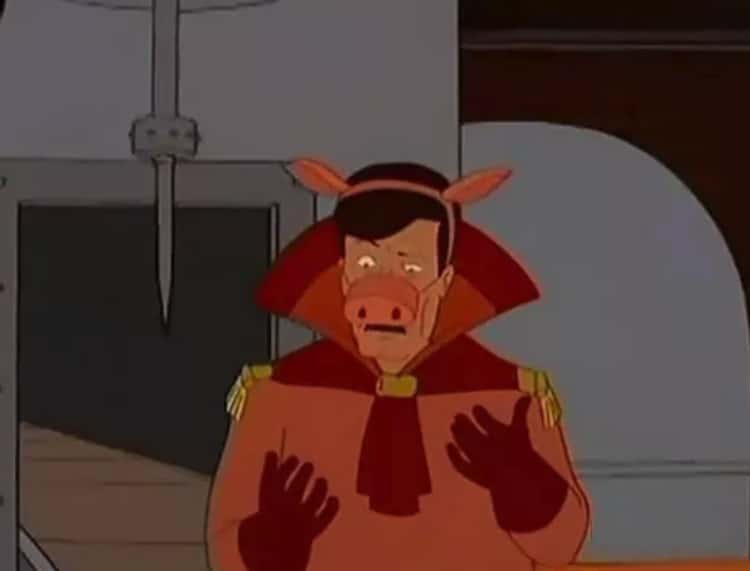
A good Halloween episode should always be a little creepy, but one King of the Hill Halloween specialwas so disturbing, it didn’t air until two seasons after its completion. “Pigmalion,” named after the George Bernard Shaw play “Pygmalion,” is considered by many fans to be the darkest episode of the series.
In the episode, Trip Larsen (Michael Keaton), the successful owner of Larsen Pork Products, dates Luanne. As the episode goes on, Trip is revealed to be a manipulative psycho who wants to become a pig from his company’s old ad. At the end of the episode, Trip regains his sanity after getting shocked by one of his slaughterhouse machines – and is eliminated seconds later.
According to the show’s commentary, the episode was written for Season 5, but Fox kept pushing it back for undisclosed reasons – presumably because of its dark content. It eventually aired during Season 7 in 2003.
